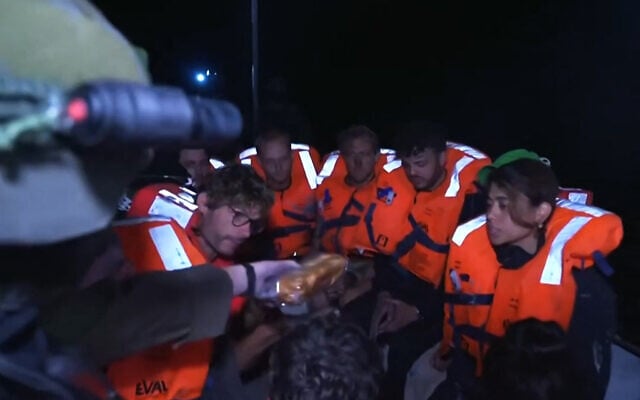

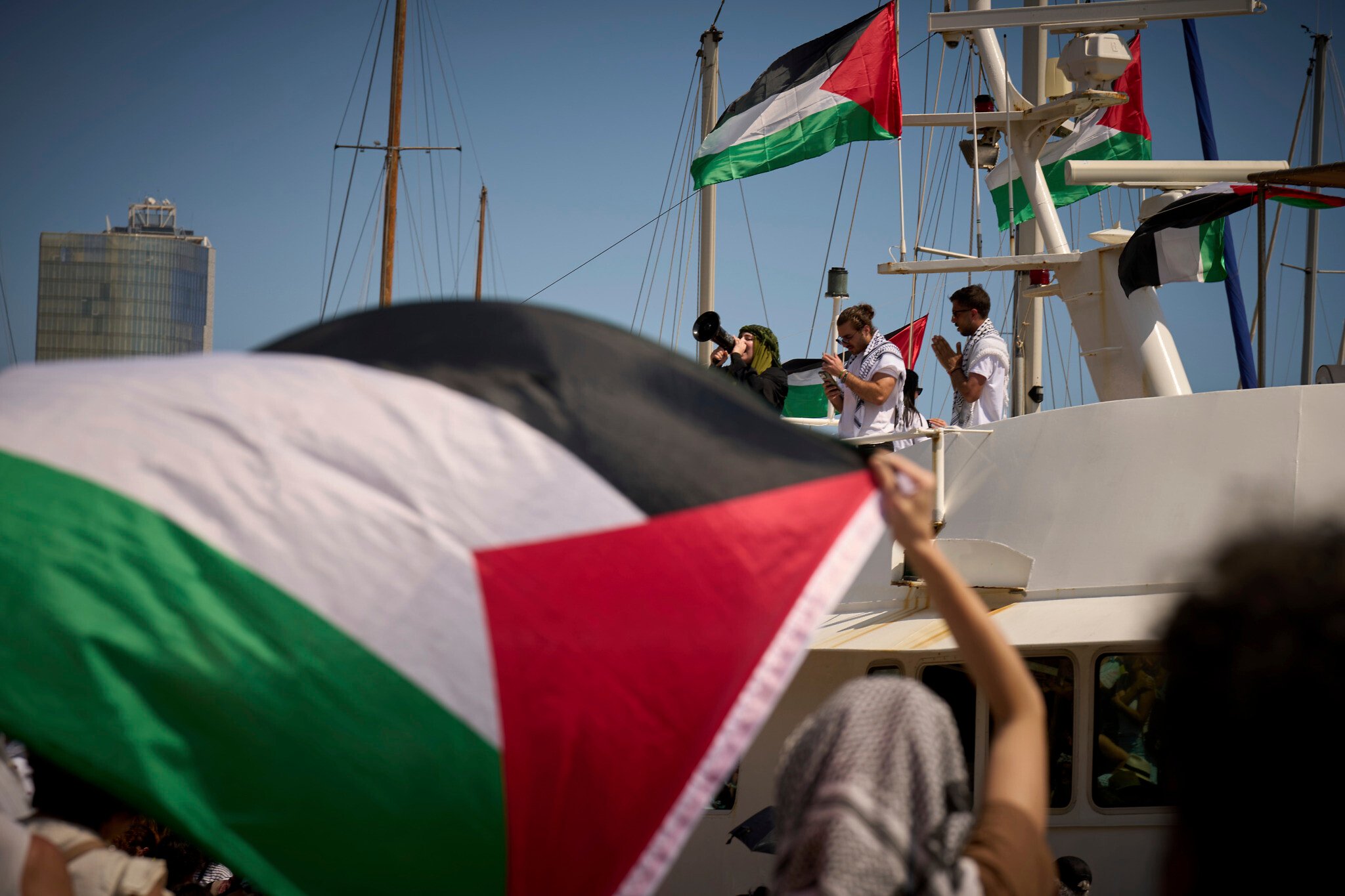
Dozens of boats led by activists, including Greta Thunberg, set sail from Barcelona on September 1 and are expected to enter Israeli waters in the coming days in the largest flotilla yet aimed at breaching Israel’s naval blockade of Gaza.
Branded the Global Sumud Flotilla, the campaign has been billed as a humanitarian mission but is widely seen by experts as an attempt to bring attention to Gaza and challenge Israel in the court of public opinion.
Carrying pro-Palestinian activists and symbolic aid, the flotilla has demanded safe passage and the creation of a humanitarian sea corridor to Gaza.
But with the enclave’s port long rendered inoperable by Israeli strikes, the practical impact of the minimal aid is expected to be negligible. Instead, experts say, the initiative is more about optics than relief.
Successfully dealing with the flotilla while avoiding being cast as an aggressor and suffering another defeat in the high-stakes battle over hearts and minds poses a complex challenge for Israel, and especially its navy, both at sea and in the media.
According to Shaul Chorev, head of the Maritime Policy and Strategy Research Center at the University of Haifa, the scale of the operation leaves the Israeli Navy with three main options: blocking the vessels before they approach the coast, boarding and diverting them as it did with a single boat in June, or — least likely — allowing them through.

“[Israel] should try to evaluate the situation according to the number of boats and according to the nature of this event,” Chorev told The Times of Israel.
“The issue here is that there are so many boats, creating a complicated situation,” Chorev explained.
He categorized the first two approaches as responses to “military scenarios,” but emphasized the flotilla is fundamentally a “media scenario.”
Israel has in the past attempted to sway the media narrative in its favor by casting the missions as publicity stunts, and the Foreign Ministry labeled Thunberg’s June attempt at breaching the naval blockade a “selfie yacht.”
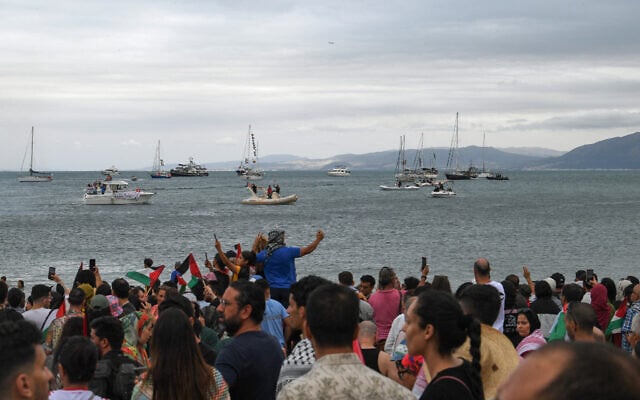
From a purely optics point of view, though, Israel’s best option is simply to let the boats through, Chorev said.
“In the media, it would give us a better image,” he argued. “I don’t see any kind of situation in which this might harm Israel’s circumstances.”
Chorev suggested Israel could allow the ships to reach Gaza alongside a parallel flotilla of hostage families, like one that set sail from Ashkelon last month in a symbolic voyage that made no real attempt to reach the enclave’s coast.
“They want to get some attention in the media,” Chorev said of the pro-Palestinian flotilla organizers, adding that if the IDF boards the vessels and detains the activists by force, it would hand them precisely the publicity they are aiming for.
He admitted that it was unlikely the Defense Ministry or IDF would approve such a plan. Far more probable, he argued, was a scaled-up repeat of the way it dealt with the Madleen in June, when Israeli forces boarded Thunberg’s vessel, detained and later deported the activists, and delivered the minimal symbolic aid to Gaza themselves.
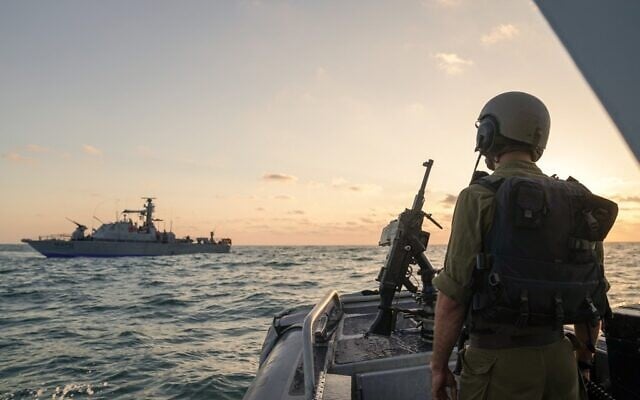
In this case too, Israel could attempt to negotiate a deal for the flotilla to turn back while transferring their cargo through official channels to Gazan civilians, before ultimately boarding the vessels if needed — essentially a blend of Chorev’s first two scenarios. Still, he cautioned, the activists are unlikely to accept such terms.
There are suspicions that Israel may also be trying to keep the ships from having a chance to challenge the blockade, after a pair of incidents this week in which boats caught fire after drones purportedly dropped flaming objects onto them while they were in Tunisian waters.
Though Tunisian authorities originally denied the claim, saying the reports “have no basis in truth,” they later described the incident as an act of “premeditated aggression” and announced the launching of an investigation into the matter.
While there is no evidence Israel was responsible, Chorev noted that in light of Jerusalem’s recent strike on Hamas leadership in Qatar, “there is a high probability that rumors like this [could turn out to be] real,” highlighting that Israel is now perceived as having the capability — and the willingness — to strike targets virtually anywhere.
Israel’s approach to flotilla missions has been largely shaped by the fallout from the Mavi Marmara incident over 15 years ago, according to Chorev.
In May 2010, Israeli commandos boarded a Turkish vessel leading a flotilla of ships trying to break the blockade, which has been in place since Hamas’s 2007 takeover of the Strip, to block arms from reaching the terror group. Activists violently resisted, setting off a chaotic melee in which 10 activists were killed, sparking international outrage and a prolonged diplomatic rift with Turkey.
Although Israel ultimately seized the ship and upheld the blockade, the political and public relations costs were steep. UN investigations were split — one body accused Israel of grave rights violations, while another panel deemed the blockade legal but criticized the IDF’s “excessive” force. Israel eventually apologized and paid compensation.
The episode underscored the risks of what experts call hybrid warfare, in which seemingly low-level confrontations are leveraged for political and media gain. Since then, Israeli naval doctrine has shifted: flotilla operations are now framed less as combat missions and more as policing operations, aimed at enforcing the blockade while minimizing confrontation and international fallout.
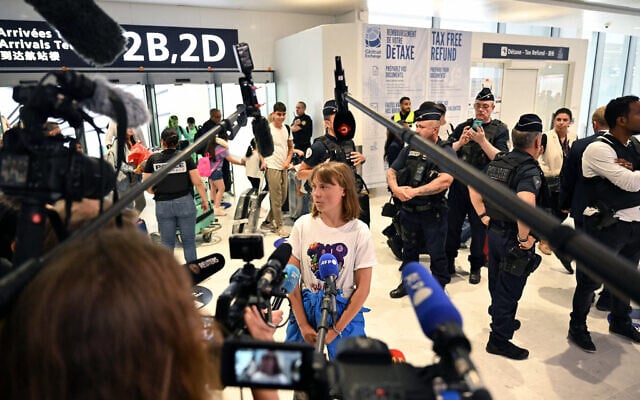
The handling of the Madleen in June offers a case in point. Israeli authorities were transparent about their activities to intercept the ship, and had statements and footage at the ready, keeping activists from being able to control the media narrative.
Troops treated the detainees with kid gloves, offering them sandwiches and water, and the incident was soon largely forgotten, helped by the outbreak of war with Iran days later.
Israel has also attempted to undermine the flotilla’s claimed raison d’être by regularly offering to transfer the humanitarian supplies being carried by the intercepted vessels to Gaza by land via regular channels.
Despite these adjustments, Chorev argued Israel still has room to innovate. He pointed to groups like Greenpeace, which have successfully disrupted oil tankers and commercial fishing boats through direct but nonlethal tactics.
In one 1996 incident, Greenpeace protesters in Seattle dived underwater and wrapped chains around the propellers of three fishing vessels to prevent them from leaving port. Chorev suggested that adopting similar methods in open water could leave future flotillas “sitting ducks” unable to reach Israel’s blockade.
Chorev argued that the latest flotilla is “part of a global trend” of anti-Israel activism, which has grown significantly since the start of the Gaza war, especially in Europe, where countries are increasingly mulling or enacting arms embargos and trade sanctions.
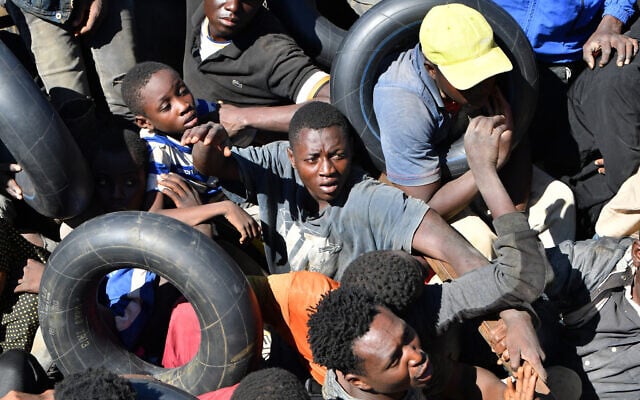
The flotilla set sail from Barcelona, with most of its participants hailing from European nations — a fact Chorev said underscores the hypocrisy at the heart of anti-Israel campaigns. While activists portray their voyage as a humanitarian mission, he argued that Europe itself has struggled to uphold humanitarian principles much closer to home, a fact he believes Israel can exploit to score points against how the flotillas are seen.
“We can show them that they are not so tolerant of accepting immigrants coming from North Africa to Italy and Spain,” he noted.
For years, tens of thousands of refugees and migrants from North Africa have risked the perilous journey across the Mediterranean to reach Europe, fleeing poverty, conflict, and instability. Many attempt to land in southern Italy or Spain, but are often met by patrols from national navies or the EU’s border security agency, Frontex. Thousands have drowned at sea, while others have been intercepted and turned back before reaching European shores.
“Speaking about Israel… trying to show us how to behave — they should look at what is happening to people from North Africa trying to immigrate to Europe, where there is zero tolerance,” Chorev said. “It’s a double standard.”



